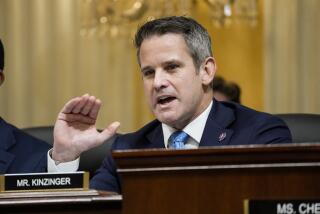‘Don’t ask’ — just do it
There was understandable exultation in September when U.S. District Judge Virginia A. Phillips declared the military’s “don’t ask, don’t tell” policy unconstitutional in a powerful opinion that also explained how the policy harmed national security. But on Monday, a federal appeals court dashed any hope that the demeaning and unjust policy would be repealed anytime soon by judicial fiat.
That makes it even more important that congressional action be taken during the lame-duck session after the election to undo the policy.
It was always doubtful whether Phillips’ order that “don’t ask, don’t tell” be immediately suspended would be allowed to stand for very long. The normal course is for a higher court to “stay” the enforcement of such a controversial judicial decision until the appeals court has ruled on the case.
That’s exactly what the U.S. 9th Circuit Court of Appeals did Monday. The majority also said that Phillips’ injunction blocking “don’t ask, don’t tell” didn’t permit enough time to train troops to adjust to a situation in which gay and lesbian service members can serve openly.
Gays and lesbians in the military can be excused for thinking that the abolition of “don’t ask, don’t tell” is taking an awfully long time. On Dec. 1, however, abolition may come a little closer, when Secretary of Defense Robert M. Gates will be presented with a study on how the ban can be lifted and what the impact will be.
Completion of the report will remove an argument for delay in congressional action to repeal “don’t ask, don’t tell.” The House voted to end the policy earlier this year, but an attempt in the Senate fell victim to a Republican filibuster.
Senate Majority Leader Harry Reid (D-Nev.) should schedule an early vote on “don’t ask, don’t tell,” and President Obama, who disappointed gay-rights advocates by appealing Phillips’ ruling, should rededicate himself to the cause of repeal, reaching out to Democrats and moderate Republicans. This is particularly important because the new Congress coming in in January may be somewhat less inclined to repeal the policy.
“Don’t ask, don’t tell” has been languishing for years. Its abolition is supported by the president and the chairman of the Joint Chiefs of Staff. Its enforcement has been relaxed with a new rule requiring that any dismissals be ordered by high-ranking officials. It’s on a collision course with the courts. Its extinction is only a matter of time, but better sooner than later.
More to Read
Get the L.A. Times Politics newsletter
Deeply reported insights into legislation, politics and policy from Sacramento, Washington and beyond. In your inbox three times per week.
You may occasionally receive promotional content from the Los Angeles Times.






